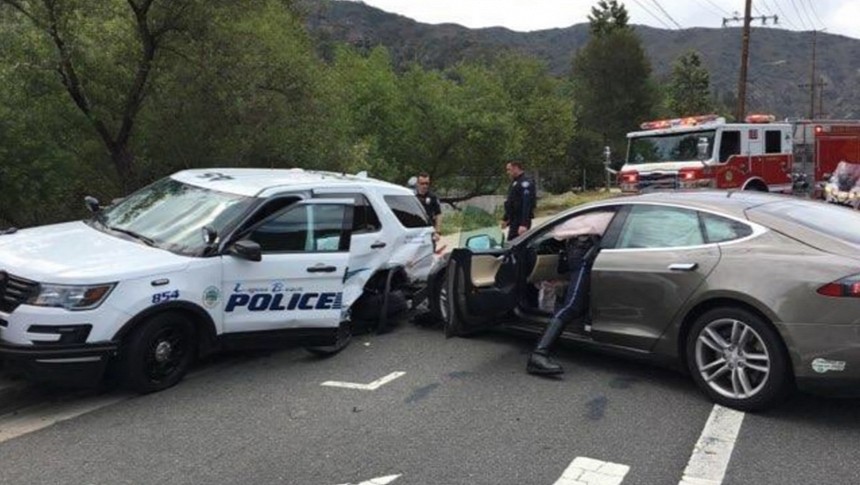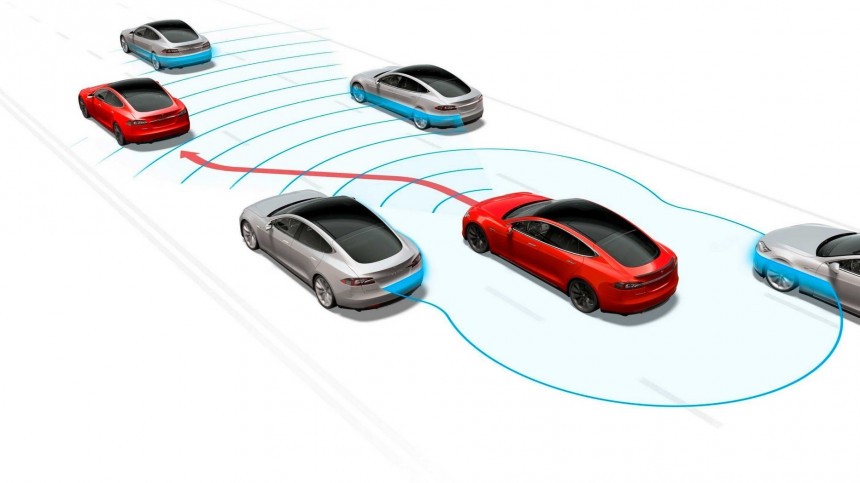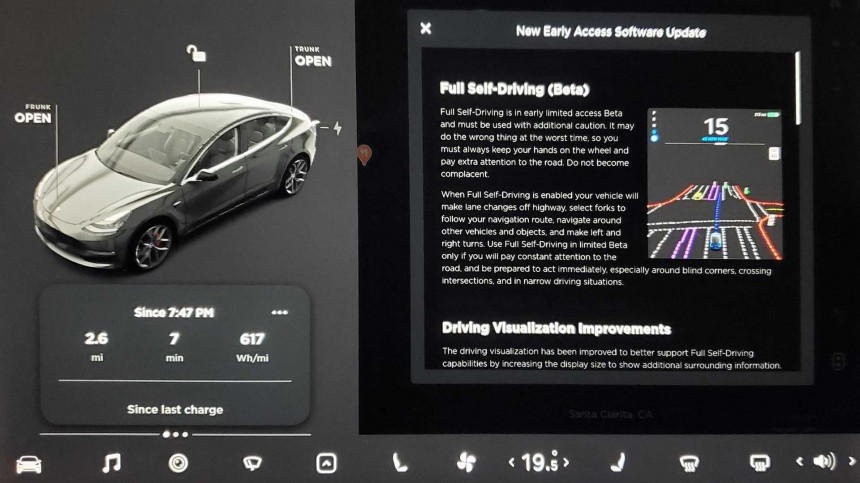We already know that Elon Musk tried to make Autopilot and Full Self-Driving (FSD) look better than they really are for years. He repeated Tesla would sell robotaxis more than once. The Tesla CEO also dictated a misleading text in an edited video claiming a car that crashed and was constantly corrected was driving itself, all because he believes his company would be "worth basically zero" without that capability. However, a story from Jonas Rest published by Manager Magazin shows how the European Union (EU) and political fears led Germany to mostly watch Tesla do as it pleased with its beta software.
Rest made an investigation that unearthed crucial information on how the German state dealt with the first confirmed death involving Autopilot in the US. Joshua Brown died on May 7, 2016, when his 2015 Tesla Model S 70D drove under a refrigerated semitrailer while traveling eastbound on US-27A west of Williston, Florida. Shortly after that, the Ministry of Transport commissioned an investigation into the system. The man in charge was Jürgen Bönninger, the managing director of FahrzeugSystemDaten GmbH until he retired in 2022. This company develops car inspection specifications in Germany. Ironically, the company's acronym is FSD – the same name of Tesla's latest attempt to deliver an autonomous vehicle.
The renowned German engineer took three Model S units and tested Autopilot extensively. Rest qualifies Bönninger's 40-page report as a horror catalog. Sadly, he mentioned only one example of an automotive horror scene: steering into oncoming traffic. The verdict was that the advanced driver assistance system (ADAS) was too dangerous for road use. The Bundesanstalt für Strassenwesen (BASt, or Federal Highway Research Institute) warned the Ministry of Transport that other road users could be threatened by Autopilot and said misuse was so common that it should be regarded as the usual operation mode.
According to Rest, the public did not learn about the report until very recently. The ministry was then led by CSU (Christlich-Soziale Union, or Christian Social Union), a party that joined Angela Merkel's CDU to govern Germany from March 14, 2018, to October 26, 2021. The Ministry of Transport eventually said there were no fundamental concerns about Tesla's road safety. The Kraftfahrt-Bundesamts (KBA, or Federal Motor Transport Authority) allowed Tesla to make minimal changes to Autopilot, reinforcing that the drivers would be responsible for the car despite using the ADAS.
The explanations for why the German government did so little are enlightening. First of all, Dieselgate was all over the headlines. Going after the most famous battery electric vehicle (BEV) manufacturer would not "have been politically acceptable." Rest was probably talking about how that would sustain conspiracy theories BEV advocates love to explore to accuse anyone of being a Big Oil ally or a spreader of fear, uncertainty, and doubt (FUD) – as if legitimate safety concerns were meant to harm the electric car shift.
Another complication derived from how automotive homologation works in the EU works. According to the rules, any vehicle that complies with the regulation of one of the member states can be sold in all countries. Tesla chose the Netherlands to homologate its cars. If Germany alone decided Autopilot could not be sold in its territory, that would raise a legal discussion with only two possible outcomes. The first is that Tesla could challenge the decision and force Germany to accept its beta software. The second could force Tesla not to offer Autopilot in any EU member state – which would reinforce the idea that the "automaker that wants to save the world" was being persecuted for fighting oil sellers' interests and that sort of drivel.
German authorities are also concerned with over-the-air (OTA) updates because of how deeply they can change ADAS behavior. Tesla customers have reported more episodes of phantom braking after updates, which also turned off radars so that these vehicles could work with Tesla Vision – a system based solely on cameras. Autonomous tech experts have already warned that they are not enough.
Apart from turning something that was deemed safe into a risk all of a sudden, authorities also fear OTA updates make it harder to keep track of any changes, such as new features. An example is the Smart Summon function, which Bönninger and FSD (his company, not Tesla's software) evaluated.
The American BEV maker claims that the vehicle will stop immediately after the user releases its button. The engineer discovered that the car may still move for up to eight seconds. That's more than enough time for a serious crash to happen. FSD also recommended that Tesla could not offer Smart Summon in Germany. KBA said that a new investigation could not confirm this operation flaw, which allowed the American BEV maker to keep it among its features until further tests are performed.
Although people should already know that no vehicle or car company will ever save the world, it is probably more difficult than ever for the German government to take a stand against Autopilot or the German equivalent of FSD. Volker Wissing belongs to FDP (Freie Demokratische Parte, the Free Democratic Party), but the current Federal Cabinet includes Die Grünen (the Greens). Considering that was an issue for CSU, this party may fear it even more to take any measure against Tesla – even if it is to improve road safety.
The renowned German engineer took three Model S units and tested Autopilot extensively. Rest qualifies Bönninger's 40-page report as a horror catalog. Sadly, he mentioned only one example of an automotive horror scene: steering into oncoming traffic. The verdict was that the advanced driver assistance system (ADAS) was too dangerous for road use. The Bundesanstalt für Strassenwesen (BASt, or Federal Highway Research Institute) warned the Ministry of Transport that other road users could be threatened by Autopilot and said misuse was so common that it should be regarded as the usual operation mode.
According to Rest, the public did not learn about the report until very recently. The ministry was then led by CSU (Christlich-Soziale Union, or Christian Social Union), a party that joined Angela Merkel's CDU to govern Germany from March 14, 2018, to October 26, 2021. The Ministry of Transport eventually said there were no fundamental concerns about Tesla's road safety. The Kraftfahrt-Bundesamts (KBA, or Federal Motor Transport Authority) allowed Tesla to make minimal changes to Autopilot, reinforcing that the drivers would be responsible for the car despite using the ADAS.
Another complication derived from how automotive homologation works in the EU works. According to the rules, any vehicle that complies with the regulation of one of the member states can be sold in all countries. Tesla chose the Netherlands to homologate its cars. If Germany alone decided Autopilot could not be sold in its territory, that would raise a legal discussion with only two possible outcomes. The first is that Tesla could challenge the decision and force Germany to accept its beta software. The second could force Tesla not to offer Autopilot in any EU member state – which would reinforce the idea that the "automaker that wants to save the world" was being persecuted for fighting oil sellers' interests and that sort of drivel.
German authorities are also concerned with over-the-air (OTA) updates because of how deeply they can change ADAS behavior. Tesla customers have reported more episodes of phantom braking after updates, which also turned off radars so that these vehicles could work with Tesla Vision – a system based solely on cameras. Autonomous tech experts have already warned that they are not enough.
The American BEV maker claims that the vehicle will stop immediately after the user releases its button. The engineer discovered that the car may still move for up to eight seconds. That's more than enough time for a serious crash to happen. FSD also recommended that Tesla could not offer Smart Summon in Germany. KBA said that a new investigation could not confirm this operation flaw, which allowed the American BEV maker to keep it among its features until further tests are performed.
Although people should already know that no vehicle or car company will ever save the world, it is probably more difficult than ever for the German government to take a stand against Autopilot or the German equivalent of FSD. Volker Wissing belongs to FDP (Freie Demokratische Parte, the Free Democratic Party), but the current Federal Cabinet includes Die Grünen (the Greens). Considering that was an issue for CSU, this party may fear it even more to take any measure against Tesla – even if it is to improve road safety.





















